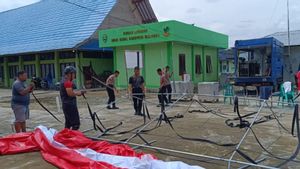TANJUNG SELOR - The Provincial Government (Pemprov) of North Kalimantan is optimistic that it can reduce the stunting rate to 14 percent by 2024, according to the national prevalence target, or even more.
"We are optimistic because in the last three years North Kalimantan has decreased significantly from 27 percent to 22 percent, now the remaining 17 percent means less than 3 percent," said North Kalimantan Deputy Governor Yansen TP in Tanjung Selor as reported by ANTARA, Wednesday, August 30.
Even so, Deputy Governor Yansen TP said that efforts to reduce stunting rates did not speak of the target numbers alone. Most importantly, there needs to be efforts to work together to improve the quality and behavior of the community.
According to him, the potential for nutritional intake in North Kalimantan is very large, supported by food potential from the agriculture, plantation, and fisheries sectors. According to the Deputy Governor, what needs to be improved is managing food into quality and nutritious intake/food.
"So the most important thing is changes in people's behavior and perspective, not institutional institutions, so if people change, stunting will disappear," he said.
Yansen TP explained that stunting management is a national priority, even Indonesian President Joko Widodo targets the stunting prevalence rate of 14 percent by 2024. This figure is below the World Health Organization (WHO) standard, which is 20 percent based on the joint agreement between the United Nations (UN).
More than that, by 2030 Indonesia is targeted to be stunted in line with the Sustainable Development Goal target through the principle of No One Left Behind.
"It should be remembered together that stunting is not only about height but also the impact on the development of the child's brain and intellectual abilities, so stunting interventions must be carried out comprehensively and committed by the parties," he said.
VOIR éGALEMENT:
The North Kalimantan Provincial Government is committed to continuing to accelerate stunting reduction by strengthening the collaborative mechanism from the aspect of data supply, planning the activity program.
Referring to data from the Indonesian Nutrition Status Survey (SSGI), currently the prevalence rate for stunting in North Kalimantan has decreased by 5.4 percent with the achievement in 2021 of 27.5 percent and 2022 of 22.1 percent. In 2023, the stunting prevalence rate is targeted to fall again to 17.5 percent.
"From the existing targets, I am optimistic that I can achieve the national target of 14 percent by 2024," he said.
The English, Chinese, Japanese, Arabic, and French versions are automatically generated by the AI. So there may still be inaccuracies in translating, please always see Indonesian as our main language. (system supported by DigitalSiber.id)
















